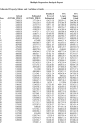Clearly, the most probable price is not a fixed benchmark, it moves relative to other sales as of the effective date.
However, the MV definition IS a fixed benchmark. We use the same defintion of MV for a 200k house as for a 2 million $ house. We use the same definition of MV in a down market as in a hot market.
If I were theoretically to appraise a same house for a refinance year after year for 5 years and other than updating the house stayed the same, if prices rose or fell I would opine a different OMV each year - year one 600k, year two 630k, year three, 700k, year four, 640k, year five 590 k ( lol the market tanked in year five and it was red hot in year three). But the MV definition was the same each year, and used to vet terms of sale for the comps as well as to create the HC terms of sale for my subject MV opinion. w

